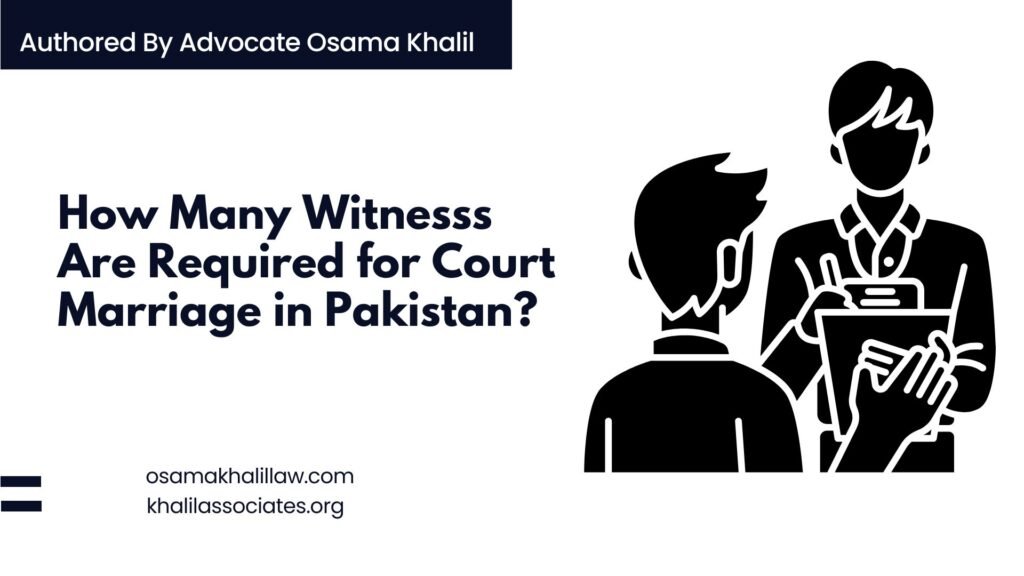
Court marriage in Pakistan is a simple and legal way to register a marriage without traditional ceremonies. However, many people wonder how many witnesses are required for court marriage in Pakistan. The law clearly states the number, but people still get confused. This article explains everything about court marriage witnesses in Pakistan in the simplest way.
What Is Court Marriage in Pakistan?
Court marriage is a legal marriage registered under the Muslim Family Laws Ordinance 1961 or the Special Marriage Act 1872 for non-Muslims. The process is quick, transparent, and avoids lengthy rituals. However, marriage witnesses in Pakistan play a crucial role in making the marriage valid.
Why Are Witnesses Important in Court Marriage?
Witnesses confirm that both partners willingly agree to the marriage. They also verify the identities of the bride and groom. Without witnesses for court marriage, the union may not be legally recognized. Therefore, choosing the right legal witnesses for nikah is essential.
How Many Witnesses Are Required for Court Marriage in Pakistan?
The law requires two witnesses for court marriage in Pakistan. These court marriage witnesses in Pakistan must be:
- Adults (at least 18 years old)
- Mentally sound
- Pakistani citizens or valid ID holders
- Present at the time of marriage registration
The witnesses sign the marriage documents, and their presence makes the marriage legally binding.
Who Can Be a Witness in Court Marriage?
Many people ask if family members can act as marriage witnesses in Pakistan. The answer is yes. The law allows:
- Relatives (father, brother, uncle)
- Friends
- Colleagues
However, the witnesses must not be directly involved in the marriage contract. They should be neutral parties who can confirm the marriage took place.
What Documents Do Witnesses Need for Court Marriage?
The witnesses for court marriage must bring:
- Original CNIC (Computerized National Identity Card)
- Two passport-sized photos
- Affidavit confirming their role as witnesses
The marriage officer verifies these documents before proceeding.
Step-by-Step Process of Court Marriage in Pakistan
1. Submission of Application
The couple submits a written application to the marriage registrar along with necessary documents.
2. Notice Period
The registrar posts a public notice for 30 days to check for objections.
3. Appearance Before Registrar
Both partners and the court marriage witnesses in Pakistan appear before the registrar.
4. Verification of Documents
The registrar checks all documents, including the CNICs of the legal witnesses for nikah.
5. Solemnization of Marriage
The marriage officer conducts the ceremony in the presence of witnesses for court marriage.
6. Issuance of Marriage Certificate
After completion, the couple receives a legal marriage certificate.
Common Misconceptions About Court Marriage Witnesses
Some people believe only men can be marriage witnesses in Pakistan. However, women can also serve as witnesses. Additionally, some think that more than two witnesses are needed, but the law clearly states only two are required.
What If Witnesses Are Not Available?
If the couple cannot arrange court marriage witnesses in Pakistan, the marriage cannot proceed. Witnesses are mandatory, and their absence makes the marriage invalid. Therefore, couples must ensure they have two reliable witnesses before applying.
Difference Between Court Marriage and Traditional Marriage Witnesses
In traditional marriages, witnesses are usually close family members. However, in court marriage requirements Pakistan, even friends or colleagues can act as witnesses as long as they meet legal conditions.
Can Non-Muslims Be Witnesses in a Muslim Court Marriage?
Yes, non-Muslims can serve as witnesses for court marriage if the marriage is registered under the Special Marriage Act. However, for Muslim marriages, it is preferable to have Muslim witnesses.
Legal Consequences of Fake Witnesses
Using fake or unauthorized legal witnesses for nikah is a criminal offense. The marriage can be annulled, and legal action may be taken against the couple and witnesses.
How to Choose the Right Witnesses for Court Marriage
Couples should select trustworthy individuals who:
- Are available on the marriage date
- Have valid CNICs
- Understand their legal responsibility
Frequently Asked Questions About Court Marriage Witnesses
Can a Woman Be a Witness in Court Marriage?
Yes, women can be marriage witnesses in Pakistan.
Do Witnesses Need to Be Present Physically?
Yes, physical presence is mandatory for court marriage witnesses in Pakistan.
Can Witnesses Be Changed Later?
No, once the marriage is registered, witnesses cannot be replaced.
Conclusion
Understanding the role of witnesses for court marriage is crucial for a smooth process. The law requires only two court marriage witnesses in Pakistan, and they must meet specific conditions. By following the correct steps and ensuring witness availability, couples can complete their court marriage without issues.
If you are planning a court marriage, always verify the latest court marriage requirements Pakistan to avoid legal complications.
Legal Assistance
For professional legal guidance and support in immigration matters, you may contact:
Mr. Osama Khalil
Lawyer & Legal Consultant
📞 Phone: 0316-1829946
📧 Email: contact@osamakhalillaw.com | contact@khalilassociates.org
